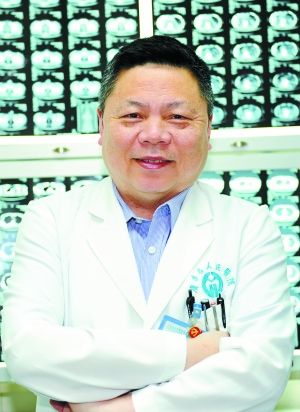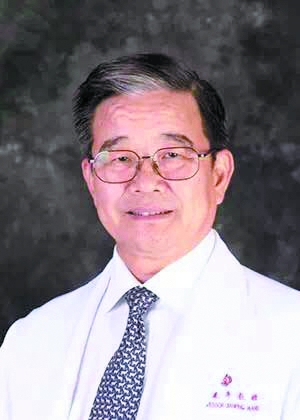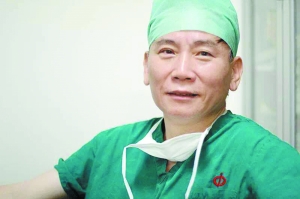How to treat cancer? Cancer treatment in the eyes of 11 oncologists
Lung cancer expert: Wu Yilong nasopharyngeal cancer expert: Ma Jun colorectal cancer expert: Wang Jianping thyroid cancer expert: Wang Shenming.
Breast Cancer Expert: Liao Ning Gynecology Oncology Expert: Sheng Xiujie Hematology Oncology Expert: Wang Shunqing Liver Cancer Expert: Wang Bailin
Gastrointestinal Oncologist: Wang Cunchuan Lymphoma Expert: Luo Rongcheng Integrated Traditional Chinese and Western Medicine Oncologist: Lin Lizhu
In recent days, the death of Wei Zexi, a 21-year-old young man suffering from synovial sarcoma, has attracted much attention.
According to the Annual Report on Cancer Registration in Guangzhou from 2013 to 2014 published by the Guangzhou Municipal Center for Disease Control and Prevention, 2.6 out of every 1,000 people in Guangzhou have cancer. In case of cancer, how to seek medical treatment rationally and scientifically? How to choose the treatment plan correctly? Guangzhou Daily reporter specially invited 11 oncologists from different fields to explain the treatment of various cancers in detail.

Wu Yilong is a leading figure in the field of lung cancer research in China, vice president of Guangdong Provincial People’s Hospital and director of Guangdong Lung Cancer Research Institute.
Lung cancer: early stage < 1cm can be surgically removed.
"Contrary to people’s misconceptions, taking medicine is often the treatment plan for advanced cancer, and surgery and radiotherapy are the best means for early or even mid-term patients."
Wu Yilong
A leading figure in the field of lung cancer research in China, vice president of Guangdong Provincial People’s Hospital, and director of Guangdong Lung Cancer Research Institute.
Professor Wu Yilong introduced that in China, there are 710,000 new cases of lung cancer every year, and one person dies of lung cancer every 30 seconds on average. In all places, especially in cities, lung cancer has been the first cause of death; From discovery to death, the survival time of patients with advanced lung cancer is often as short as a year and a half.
Wu Yilong pointed out that low-dose spiral CT screening once a year can reduce the mortality of lung cancer by 20%. Surgical resection of canceration less than 1 cm does not require chemotherapy, and the postoperative survival rate is very good. More than 80% of the patients survived for more than 10 years, and 20% died after 10 years, many of them died of other diseases. This effectiveness has almost been cured.
Wu Yilong emphasized that before the treatment of lung cancer, "a trilogy should be sung": pathological diagnosis, lung cancer staging and genetic testing.
Pathological diagnosis, through surgery, biopsy, puncture and other methods, to diagnose whether the lesion is cancer, small cell cancer or non-small cell cancer. According to the staging of lung cancer, PET/CT is used as an examination method to judge the severity of lung cancer, and can well locate the focus of lung cancer and whether there is cancer metastasis. Non-medical personnel only need to know whether the staging is primary, whether there is lymph node metastasis or distant metastasis. Genetic testing, after the diagnosis of lung cancer, spend about 2000 yuan to do genetic testing to check whether there is "epidermal growth factor receptor" gene mutation.
After completing this trilogy, Wu Yilong suggested that the treatment plan should be decided according to the staging of lung cancer and the results of genetic testing. If it is a stage I lung cancer, surgery is undoubtedly the best treatment. Let the doctor do surgery as soon as possible, which can be completely cured. In the second stage of lung cancer, surgery is the main comprehensive treatment; Stage III lung cancer, which is already a serious degree, should be treated with comprehensive non-surgical treatment. In the fourth stage of lung cancer, drugs are the main treatment.
"Contrary to people’s misconceptions, taking medicine is often the treatment plan for advanced cancer, and surgery and radiotherapy are the best means for early or even mid-term patients." Professor Wu Yilong pointed out that at present, early lung cancer surgery usually only makes two holes in the chest, and it is very safe to perform minimally invasive surgery with thoracoscope.
In addition, many lung cancer patients did not do genetic testing, even knowing that there was no genetic mutation, but insisted on trying targeted drugs. This makes Wu Yilong very anxious-clinical medicine has confirmed that if there is no target of gene mutation, the effective control survival time of taking targeted drugs is only 1.6 months, which is no different from not taking any drugs, delaying illness, increasing expenses and bringing serious side effects to patients.
Regarding the "cellular immunotherapy" in the Wei Zexi incident, Wu Yilong pointed out that in recent years, it has been very popular among lung cancer patients all over the country. Many patients who have not detected gene mutation have received immune cell extraction, medical cultivation and proliferation, and then injected them into the body, and the cost is as high as 20,000 yuan/time. However, at the latest national lung cancer summit forum, 95% of the lung cancer experts in the country stated: "We do not advocate cell therapy at this stage, but should do research in the laboratory." Although the national health department has issued a technical standard for cell therapy, the prescribed standard is only used for laboratory research, not clinical; Although many local medical insurance companies include the cost of this treatment in medical insurance reimbursement, it is actually against the requirements of medical ethics, because the treatment in the research stage should not be charged.

Nasopharyngeal carcinoma: Early patients only need radiotherapy.
"Early patients don’t need chemotherapy, radiotherapy is ok. Patients in the middle and late stage should do chemotherapy first, reduce the tumor, and then do radiotherapy, or add chemotherapy at the same time as radiotherapy. The chemotherapy situation is very complicated and needs to be adjusted by the doctor according to the patient’s situation. "
Ma Jun
Executive Deputy Director of Cancer Center of Sun Yat-sen University and Executive Vice President of Affiliated Cancer Hospital.
70%~80% of patients with nasopharyngeal carcinoma have reached the local middle and late stage when they are diagnosed. Therefore, once diagnosed, patients are usually anxious and require immediate treatment. "Many patients don’t know that pathological diagnosis is only the first step of diagnosis, and treatment can’t be started immediately." Ma Jun explained that the current diagnosis and treatment mode of nasopharyngeal carcinoma is based on TNM staging of tumor, where T stands for local tumor invasion, N stands for local lymph node metastasis, and M stands for distant organ metastasis.
The treatment methods of patients in different stages are very different. For example, patients in the early stage only need radiotherapy, while patients in the middle and late stage need comprehensive treatment combining radiotherapy and chemotherapy. Then, in order to accurately determine the TNM stage of the patient, at this time, nasopharyngeal+neck MR and general examination are needed to determine the stage of the disease, so as to make an accurate clinical diagnosis for the patient and formulate a more individualized treatment strategy.
Radiotherapy is an important treatment for nasopharyngeal carcinoma, while chemotherapy depends on the stage of the disease. "Early patients don’t need chemotherapy, radiotherapy is ok. Patients in the middle and late stage should do chemotherapy first, reduce the tumor, and then do radiotherapy, or add chemotherapy at the same time as radiotherapy. The chemotherapy situation is very complicated and needs to be adjusted by the doctor according to the patient’s situation. " Ma Jun pointed out that radiotherapy will do some damage to oral mucosa and skin, so it is necessary to deal with the hidden dangers of oral cavity before the start of treatment. During radiotherapy, we should pay attention to oral cleaning, drink plenty of water and gargle, and protect the neck skin. We should wear loose, low-necked and cotton sweat-absorbent clothes.
Many people worry that radiotherapy is radioactive, or it will bring hoarseness and other sequelae. In fact, there is absolutely no need to be afraid of radiotherapy. With the introduction of intensity modulated radiotherapy equipment with superior performance and the implementation of "precise radiotherapy" strategy, the sequelae caused by radiotherapy have been greatly reduced. After radiotherapy, it is basically reviewed once every 3-6 months, and once a year after 3 years. The examination items are nasopharyngeal endoscopy, nasopharyngeal magnetic resonance, X-ray and B-ultrasound to exclude metastatic lesions. After radiotherapy, patients often have pus in their ears. Usually, be careful not to catch a cold and don’t let water into their ears when taking a bath.

Head of Colorectal and Anal Surgery Group of Surgery Branch of Chinese Medical Association of Wang Jianping, Chief Expert of Gastrointestinal and Anal Surgery in the Sixth Affiliated Hospital of Sun Yat-sen University.
Colorectal cancer: preoperative radiotherapy and chemotherapy help to "preserve anus and function"
The desire of rectal cancer patients to "keep the anus" is often very strong. In the past, for many rectal cancers located near the anus, it was difficult for patients to get what they wanted because of the limitation of indications. Nowadays, with the implementation of preoperative neoadjuvant radiotherapy and chemotherapy, the tumor is expected to shrink before operation, which has the conditions of anus preservation.
Wang Jianping
Head of Colorectal and Anal Surgery Group, Surgery Branch of Chinese Medical Association, and Chief Expert of Gastrointestinal and Anal Surgery in the Sixth Affiliated Hospital of Sun Yat-sen University.
In the past ten years, the incidence of colorectal cancer in Guangzhou has increased by 50%, and now it ranks second in the incidence of malignant tumors in the city. In China, about 60% of the cases occur in the rectum, and about 60% of them occur in the middle and low rectum. Wang Jianping pointed out that nearly 80% of patients were in the middle and late stage when they were found, and the treatment effect was poor.
Wang Jianping said that after the diagnosis of colorectal cancer, patients still need to check CT (Computed Tomography) and MRI (Nuclear Magnetic Resonance) in order to make preoperative staging, judge whether the tumor has metastasized to mesentery, peripheral lymph nodes and distant organs, and then determine the treatment plan. Among them, CT will be more clear to see whether the tumor has distant metastasis, while for colorectal cancer, especially rectal cancer, MRI has more advantages in the differentiation and preoperative staging of local infiltration and peripheral lymph node metastasis, and the combination of the two will be more accurate.
In recent years, the medical profession has promoted "precision medicine", and MDT (Multidisciplinary Diagnosis and Treatment) has become the mainstream model. Wang Jianping pointed out that each patient’s tumor condition and physical condition are different, which requires full discussion by MDT team and joint evaluation by experts in related disciplines, so as to formulate personalized diagnosis and treatment plans to ensure the safety and benefits of patients to the maximum extent. "Neoadjuvant radiotherapy and chemotherapy is the standard treatment for middle and low rectal cancer. When we discuss MDT, if the position of rectal cancer is too low, or if the patient has a strong desire to preserve anus, it may be possible to reduce the tumor by adding radiotherapy and chemotherapy before surgery, so in this case, new adjuvant radiotherapy and chemotherapy may be considered. " Wang Jianping pointed out. In a recent study on locally advanced rectal cancer led by him, it was found that if the tumor is relatively high, or the tumor is located in the posterior wall of rectum, it is even possible to achieve the goal of tumor reduction through simple chemotherapy, thus avoiding the side effects of radiotherapy.
In dealing with colorectal cancer, Wang Jianping said frankly that the most effective treatment is still surgery, and on the basis of treating tumors, preserving sexual function, defecating and urinating are the directions he is committed to. Among them, the desire of rectal cancer patients to "keep the anus" is often very strong. In the past, for many rectal cancers located near anus, it was difficult for patients to get what they wanted because of the limitation of surgical indications. Nowadays, with the implementation of preoperative neoadjuvant radiotherapy and chemotherapy, the tumor is expected to shrink before operation, which has the conditions of anus preservation. In fact, Wang Jianping has also successfully saved the anus for some patients whose tumors are 1 cm close to the anal sphincter. Three to five days after surgery, when doctors make rounds, they usually ask patients a very private question: Is there an erection at night? This is because in radical resection of rectal cancer, patients’ pelvic autonomic nerves are easily injured, which leads to postoperative sexual dysfunction. However, he also said that some patients did not have nocturnal erections until ten days after surgery.
Preoperative neoadjuvant radiotherapy and chemotherapy can not only help to "preserve anal function", but also help to reduce the recurrence rate. Some data indicate that it can improve the 5-year survival rate of rectal cancer patients by about 10%. However, Wang Jianping stressed that about 30% of colorectal cancer patients are still insensitive to preoperative radiotherapy and chemotherapy, considering individual differences and tumor characteristics.

Leader and chief expert of vascular thyroid and breast surgery in the First Affiliated Hospital of Sun Yat-sen University, Wang Shenming, and head of vascular surgery group of surgical society of Chinese Medical Association.
Thyroid cancer:
Relatively "gentle" temper
No need to remove the whole thyroid gland.
Thyroid cancer is a kind of malignant tumor with relatively mild temper. Although new methods of diagnosis and treatment emerge one after another, surgery is still the most important and effective radical treatment for thyroid cancer.
Wang Shenming
Leader and chief expert of vascular thyroid and breast surgery in the First Affiliated Hospital of Sun Yat-sen University, and head of vascular surgery group of surgical society of Chinese Medical Association.
Ten years ago, 4.5 out of every 100,000 people in Guangzhou suffered from thyroid cancer. By 2011, its incidence rate had reached 10.53/100,000 people, which increased by 134% in eight years.
As soon as they hear that they have thyroid cancer, many people immediately bear a heavy ideological burden. In fact, compared with other kinds of cancer, thyroid cancer is a kind of malignant tumor with relatively mild temper. "Some thyroid cancers can be controlled by taking medicine for life without surgery. Therefore, some experts suggest that thyroid microcarcinoma, which has no biological activity itself, can be left alone. The problem now is that doctors have failed to accurately determine which thyroid cancers fall into these ranges. " Professor Wang Shenming said that in view of the great impact of malignant tumors on patients, when thyroid nodules are suspected to be malignant, treatment is still recommended. "Surgery is the first choice of treatment." Wang Shenming said that even if it is a small cancer, 40% will have lymphatic metastasis, and the probability of bone metastasis and lung metastasis is 10%~20%. Minimal cancer surgery usually does not require total thyroidectomy, postoperative radiotherapy and chemotherapy, and the five-year survival rate can reach 95%. Surgical treatment of thyroid cancer is still the best choice at present, and the current surgical methods can make the scar inconspicuous and meet the cosmetic needs.
Even for unresectable thyroid cancer, other treatments can be taken, such as drug treatment, but the recurrence rate is high, which is 50%.
Because of its radioactivity, isotope therapy is not suitable for patients under the age of 20, and barren women should be extra cautious. At the same time, the dose of isotope therapy should be mastered. If the dose is too small, it can’t be controlled. If the dose is too large, it will cause the patient’s "hypothyroidism". It is necessary to take medicine for life to supplement thyroxine.
Interventional therapy can also be taken now. It is mainly used as an auxiliary means, such as interventional therapy before surgery to create favorable conditions for surgery.
Surgery is the first step, and most patients have to take thyroid preparations, such as Eupatorium, for replacement therapy or thyroid stimulating hormone suppression therapy within a certain period of time. A small number of patients may also receive radioisotope therapy.

Breast cancer:
The best treatment lies in personalization.
Don’t "take experience" from patients.
In recent years, the comprehensive treatment of breast cancer is getting better and better, and the mortality rate is much lower than that of lung cancer and liver cancer. The cure rate of early breast cancer (based on 5 years) is above 95%, and it is generally 70% to 80% in the middle stage.
Liao Ning
Director of Breast Department, Cancer Center, Guangdong Provincial People’s Hospital
According to Professor Liao Ning, breast cancer has always been the top female cancer in China. The Report on Breast Cancer in China published in the special issue of The Lancet, the world’s top medical journal, points out that 12 out of every 100 newly diagnosed breast cancer cases in the world are from China.
In the eyes of patients, the choice of oncology or breast, internal medicine or surgery means the choice of breast-conserving or surgical resection. In the eyes of experts, it is not so simple: never "take experience" from patients. For example, if others succeed in breast-feeding, I also want to breast-feed; It’s good for others to take targeted drugs, so I’ll take them.
Liao Ning pointed out that breast cancer is a group of diseases, which can be divided into at least four subtypes: Luminal A, B, HER2 positive and basal cell-like carcinoma (triple negative). LuminalA type is the most common, accounting for about 60% of the total number of breast cancer.
The treatment of breast cancer has changed from simple surgical resection to surgical treatment, combined with radiotherapy, chemotherapy, endocrine therapy, biological targeted therapy and other comprehensive treatments.
The optimal treatment is personalized precise treatment, and its basis is genotyping. Take HER2 positive breast cancer as an example, it is not sensitive to conventional chemotherapy and radiotherapy. Now authoritative guidelines at home and abroad require that standardized anti-HER2 targeted therapy must be carried out, and it can obviously benefit. For patients, after the diagnosis, the detection of HER2 directly determines the starting point of the treatment plan. The detection methods mainly include immunohistochemistry (IHC), chromogenic in situ hybridization (CISH) and fluorescence in situ hybridization (FISH), and the latter two methods are more accurate.
Liao Ning recommended the best treatment scheme for advanced HER2-negative breast cancer released by ASCO: systematic treatment based on endocrine therapy and sequential chemotherapy. Among them, endocrine therapy should be the first-line treatment for patients with advanced hormone receptor positive breast cancer. Except for the following few cases: ER+ patients can choose endocrine therapy, and chemotherapy can be directly chosen for those who are life-threatening and suspicious of endocrine therapy resistance.
